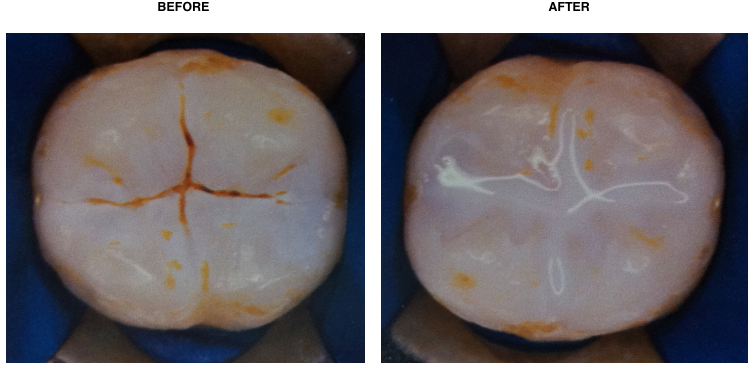MANAGEMENT OF THE EARLY DENTAL CAVITY

In my practice I find patients from all walks of life and of various ages afflicted by dental caries ( cavities), an infectious disease resulting in the destruction of natural tooth structure. What causes this phenomenon are acid-producing bacteria found in dental plaque. In the presence of sugar this combination could prove to completely destroy the essence of our smile....our teeth!
I have decided to pursue what I refer to as a "medical model" in the avoidance and prevention of this type of dental tissue damage known as dental decay, or cavities. Like most diseases, this too can be detected, diagnosed, and treated at an early stage, eliminating the need for complicated and costly surgical intervention. Modern caries therapy should include as much prevention and management as possible. This simply means that I have chosen to NOT restore, or fix, every single cavity I find in my patients' mouths. Early lesions can be monitored, followed, and finally arrested ( or stopped ) when proper protocols are put in place and followed by the patient. Caries risk factors are easily determined through my initial oral examination. Additionally, a conversation with my patients allows me to understand the protective factors available to assist us in managing these early dental cavities. Whenever possible, our aim is to follow a "medical model" designed to detect cavities at early stages and later create an environment conducive to arresting ( or stopping ) the progression of these.
Below I have outlined some of the risk and protective factors involved in early caries detection and management. My purpose is to educate my patients on how to work with me in a team concept to prevent these cavities from worsening over time, thereby eliminating complex and costly treatment in the future.
RISK FACTORS ASSOCIATED WITH DENTAL CAVITIES
- Regular intake of sugar foods and liquids
- Decreased salivary flow
- High plaque index
- Dental appliances in the way of proper home care
- Healthy history including: autoimmune diseases, radiation therapy to the head and neck, eating disorders, medication which decreases salivary flow
- Bad bite/crowding/malocclusion
- Genetic component
PROTECTIVE FACTORS ASSOCIATED WITH THE PREVENTION OF DENTAL CAVITIES
- Daily brushing and flossing
- Excellent home care
- Professional dental maintenance
- Good salivary flow
- Use of fluoride and other anti-cavity agents
- Flouridated water
- Use of fluoridated tooth paste and rinses
- Balanced diet low in fermented sugars and acids
Some of the cavity assessment indicators I find to be indicative of patients' elevated caries risks may include findings such as:
- Recent fillings throughout the mouth, placed within the last three years
- Dark shadows on or between teeth seen on radiographs
- Lesions in the teeth which may appear as breaks in the tooth structure or holes on the surface or between the teeth
- White or brown spots indicating early cavities
The best weapon against the progression of decay is taking a proactive approach to keeping these lesions as small and localized as possible. My initial patient examination, the set of radiographs, and finally my patient conversation will provide all the information necessary to design a plan of action. The directed approach is focused on regular and proper home care, professional assessments, and the use of anti-cavity agents and habits proven to eliminate or reduce the destruction initiated by decay-causing bacteria.
Please contact me should you have specific questions or comments on how to initiate personalized plan for you!


